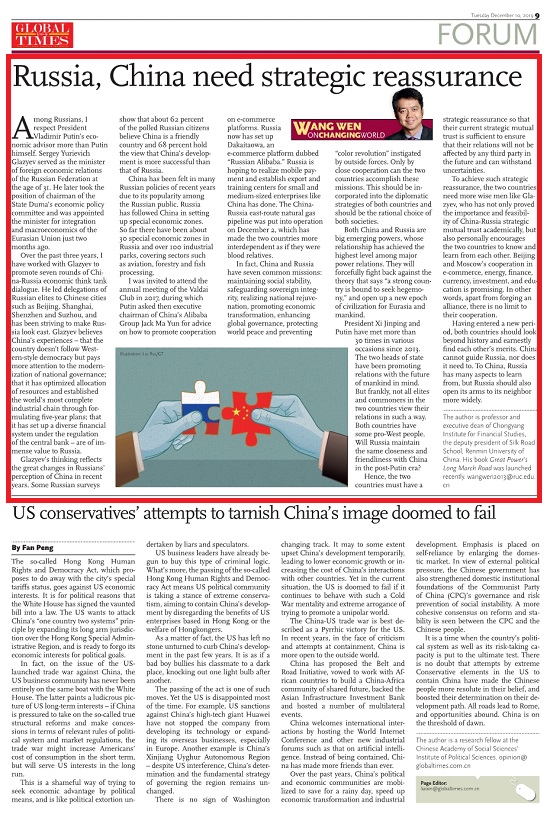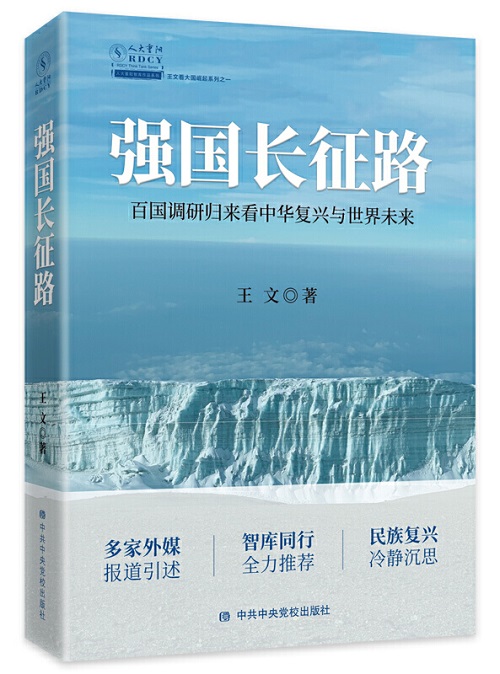Commentaries
Your Present Location: Teacher_Home> Wang Wen> CommentariesWang Wen: Russia, China need strategic reassurance
By Wang Wen Source: Global Times Published: 2019-12-10

Among Russians, I respect President Vladimir Putin's economic advisor more than Putin himself. Sergey Yurievich Glazyev served as the minister of foreign economic relations of the Russian Federation at the age of 31. He later took the position of chairman of the State Duma's economic policy committee and was appointed the minister for integration and macroeconomics of the Eurasian Union just two months ago.
Over the past three years, I have worked with Glazyev to promote seven rounds of China-Russia economic think tank dialogue. He led delegations of Russian elites to Chinese cities such as Beijing, Shanghai, Shenzhen and Suzhou, and has been striving to make Russia look east. Glazyev believes China's experiences - that the country doesn't follow Western-style democracy but pays more attention to the modernization of national governance; that it has optimized allocation of resources and established the world's most complete industrial chain through formulating five-year plans; that it has set up a diverse financial system under the regulation of the central bank - are of immense value to Russia.
Glazyev's thinking reflects the great changes in Russians' perception of China in recent years. Some Russian surveys show that about 62 percent of the polled Russian citizens believe China is a friendly country and 68 percent hold the view that China's development is more successful than that of Russia.
China has been felt in many Russian policies of recent years due to its popularity among the Russian public. Russia has followed China in setting up special economic zones. So far there have been about 30 special economic zones in Russia and over 100 industrial parks, covering sectors such as aviation, forestry and fish processing.
I was invited to attend the annual meeting of the Valdai Club in 2017, during which Putin asked then executive chairman of China's Alibaba Group Jack Ma Yun for advice on how to promote cooperation on e-commerce platforms. Russia now has set up Dakaitaowa, an e-commerce platform dubbed "Russian Alibaba." Russia is hoping to realize mobile payment and establish export and training centers for small and medium-sized enterprises like China has done. The China-Russia east-route natural gas pipeline was put into operation on December 2, which has made the two countries more interdependent as if they were blood relatives.

In fact, China and Russia have seven common missions: maintaining social stability, safeguarding sovereign integrity, realizing national rejuvenation, promoting economic transformation, enhancing global governance, protecting world peace and preventing "color revolution" instigated by outside forces. Only by close cooperation can the two countries accomplish these missions. This should be incorporated into the diplomatic strategies of both countries and should be the rational choice of both societies.
Both China and Russia are big emerging powers, whose relationship has achieved the highest level among major power relations. They will forcefully fight back against the theory that says "a strong country is bound to seek hegemony," and open up a new epoch of civilization for Eurasia and mankind.
President Xi Jinping and Putin have met more than 30 times in various occasions since 2013. The two heads of state have been promoting relations with the future of mankind in mind. But frankly, not all elites and commoners in the two countries view their relations in such a way. Both countries have some pro-West people. Will Russia maintain the same closeness and friendliness with China in the post-Putin era?
Hence, the two countries must have a strategic reassurance so that their current strategic mutual trust is sufficient to ensure that their relations will not be affected by any third party in the future and can withstand uncertainties.
To achieve such strategic reassurance, the two countries need more wise men like Glazyev, who has not only proved the importance and feasibility of China-Russia strategic mutual trust academically, but also personally encourages the two countries to know and learn from each other. Beijing and Moscow's cooperation in e-commerce, energy, finance, currency, investment, and education is promising. In other words, apart from forging an alliance, there is no limit to their cooperation.
Having entered a new period, both countries should look beyond history and earnestly find each other's merits. China cannot guide Russia, nor does it need to. To China, Russia has many aspects to learn from, but Russia should also open its arms to its neighbor more widely.
The author is professor and executive dean of Chongyang Institute for Financial Studies, at Renmin University of China and executive director of China-US People-to-People Exchange Research Center. His new book Great Power's Long March Road was launched recently.
























































































 京公网安备 11010802037854号
京公网安备 11010802037854号





